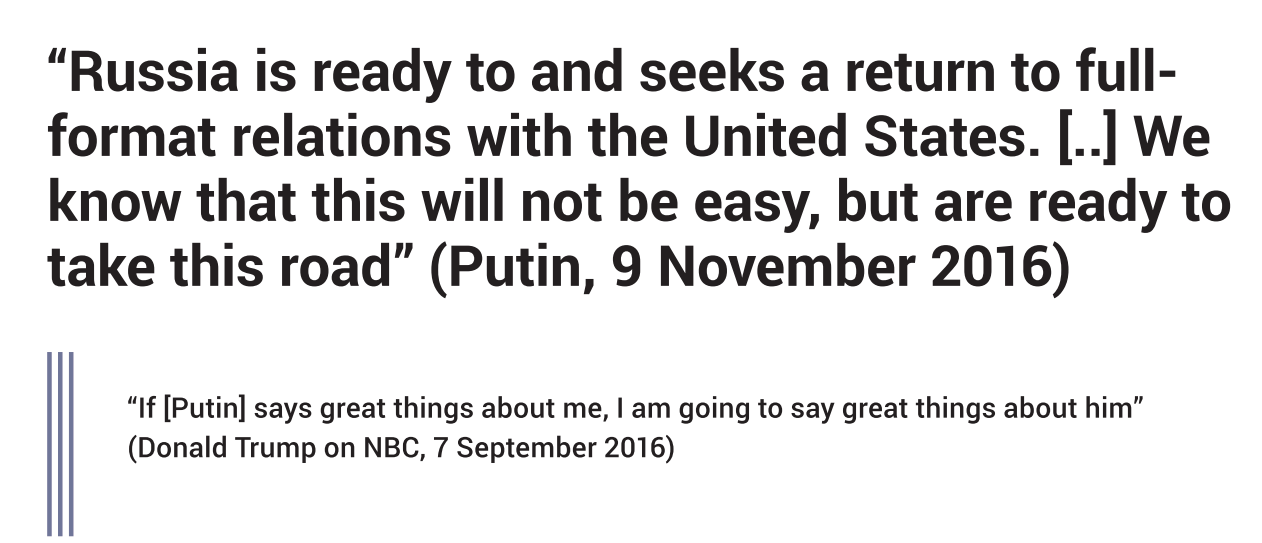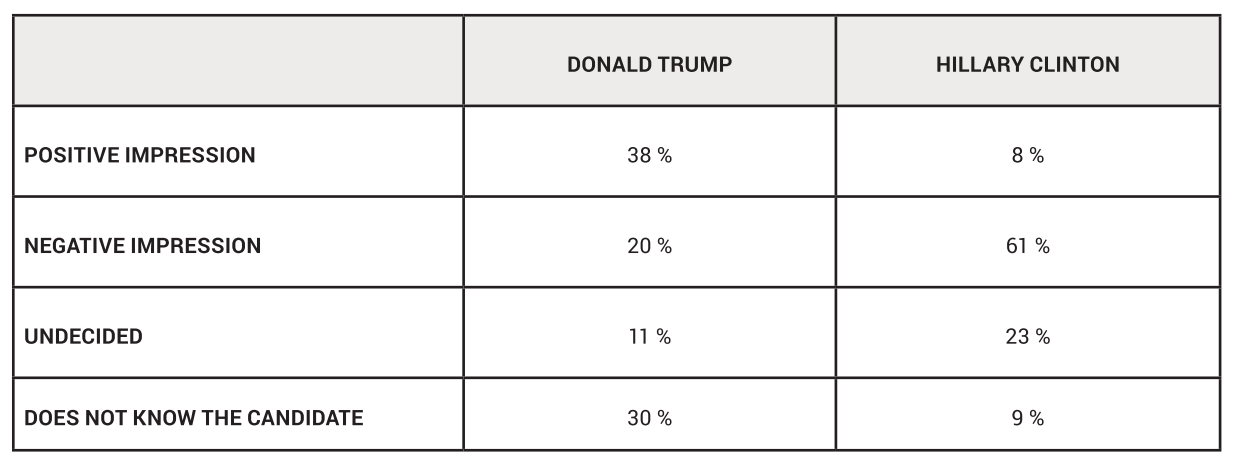Donald Trump and US-Russian Relations: Geopolitical Bromance or Business-as-Usual?
23 Nov 2016
By Flemming Splidsboel Hansen for Danish Institute for International Studies (DIIS)
This article was external pageoriginally publishedcall_made by the external pageDanish Institute for International Studies (DIIS)call_made on 16 November 2016.
The Russian regime is ready to re-set its troubled relationship with the USA. While hopes are high, specific expectations are lower and the Trump presidency may eventually offer Russia a smaller action space than suggested by the campaign statements.
RECOMMENDATIONS
■ Prepare for a short-term future of great uncertainty as Trump defines and implements his foreign policy vis-à-vis Russia.
■ Prepare for a mid- and long-term future where Western Europe may have to take greater responsibility for handling the challenge posed by contemporary Russia.
■ Prepare for a mid- and long-term future where Russia may feel emboldened to attempt to exert influence over Eastern and Central Europe.
The 2016 US presidential election was unusually dramatic. Part of the drama was allegedly provided by the Russian authorities as some of their state-sponsored hackers broke into servers of the Democratic National Committee and released compromising emails immediately prior to the July 2016 Democratic Party Convention.
While the Democratic Party candidate Hillary Clinton immediately pointed to Russian interference, accusing the Kremlin of attempting to discredit her campaign, then Republican Party candidate Donald Trump dismissed these direct allegations, suggesting during the first presidential debate that “it could be Russia, but it could also be China. It could also be lots of other people”. However, in October 2016 the US Intelligence Community formally accused the Russian authorities of breaking into US servers with the intent of influencing the presidential election.
It is widely believed, that the rationale for this was a hope in the Kremlin that the release of compromising information about Clinton and the Democratic Party would prevent the former from being elected, thus helping to pave the way for the Trump presidency.

The view from Russia
Opinion polls showed no widespread endorsement of Trump by Russian respondents. In fact, both candidates were viewed with some scepticism - but Clinton was rejected more unequivocally (see fig. 1). Thus, to illustrate, an October 2016 survey showed that while 38 percent of Russian respondents indicated a positive impression of Trump, 20 percent thought of him in negative terms (11 percent were undecided and 30 percent knew nothing about him). The corresponding figures for Clinton were much clearer eight percent and 61 percent, respectively (as well as 23 percent and nine percent, respectively).
When asked about the expected consequences of the election for Russian interests, 44 percent of those polled in October 2016 expressed the belief that a Trump victory would be good for those interests, while a mere seven percent found that a Clinton presidency would serve the interests of Russia better. 37 percent expected Russian-US relations to improve under Trump, while 35 percent believed that they will remain unchanged and six percent indicated that they are likely to deteriorate.
Figure 1: Russian poll on the US presidential candidates

This view of Trump is predominantly based on his campaign, during which he made a number of statements that seem highly promising from a Russian perspective. The support for Trump must also be viewed, however, within the context of the clear rejection of Clinton. The former US Secretary of State is viewed in Moscow most importantly as an interventionist, defined here as someone willing to go to relatively great lengths – even including violating the sovereignty of other states - in other to further US interests and to “do good”. Her alleged interventionism is also believed to have a strong anti-Russian element. Russian critics point to her diplomatic efforts to secure the introduction in 2011 of a no-fly zone over Libya and her open support for a more active policy to force the resignation of Syrian president Bashar al-Assad as confirmation of anti-Russian sentiment. Russian now hopes that Trump will focus less on moral issues, and that he will prove more willing to engage Russia in a constructive partnership.
The great uncertainties
Campaign statements by Trump have widely been interpreted as pointing in a neoisolationist direction. He has made it clear that he believes the USA has become embroiled in too many regional conflicts, with little direct bearing on the national interests of the USA and from which there is no easy escape. As part of this, he has insisted that regional powers, especially US allies, should do more to solve conflicts in their own region and thus relieve the USA of an unnecessary burden.
His understanding of concepts such as sovereignty and national interests as well as his view on the use of military power may correspond to the dominant line in Russia. Few in Moscow expect Trump to respect the sovereignty of other states more than Clinton would – but it is expected that he may violate that sovereignty less frequently and for reasons more connected with a traditional interpretation of national interests, in which the moral drive is absent. A central tenet of this traditional interpretation, is that the state should maximize autonomy in decision-making, thus avoiding to be tied down by an unnecessary dependence on others or by legal restrictions. Naturally, this also relates to the military domain, where the state should maximize its freedom to act when and where it deems necessary.
Hopeful Russian observers interpret this similar approach to politics as a possibility for an improved Russian-US relationship. If both states speak the same language of politics, it is argued, a mutual understanding may be arrived at more easily. More cautious observers on the other hand, insist that two states operating on the particular set of shared principles outlined, may actually clash precisely as a result of this. Russian President Vladimir Putin in his congratulatory remarks noted that a normalization of relations with the USA will “not be easy” and in this may be a realization that the Trump presidency may not necessarily bring the amount of changes expected by many.
Two important regions
Russian politicians now have their eyes set on two regional theatres. The first is the Middle East, where Russia has been involved militarily in Syria since September 2015. Campaign statements by Trump indicate that he may accept al-Assad as part of the future of Syria and restrict US involvement to fighting the so-called Islamic State (IS) in some form of cooperation with Russia. This is good news for Russia, whose main objective seems to have been to preserve a pro-Russian regime in Syria. It does not, however, relieve Russia of the unenviable future task of propping up a regime that will remain highly vulnerable even following the eventual defeat of IS.
The second theatre is Ukraine and, with that, the rest of Eastern Europe which sits on the side-lines of both NATO and the European Union. Trump has famously warned that “NATO is obsolete” and that the European allies need to take on a greater responsibility for solving the conflict in Eastern Ukraine. Against this backdrop, Russian policy-makers are hoping that the USA will become less committed to Europe and that both NATO and the EU will see increasing buck-passing and fragmentation among their respective member states. Such a scenario could offer new opportunities for Russia.
The costs for states such as Ukraine and Georgia of choosing a pro-Western line may become prohibitively high as Russia gets a more free hand to discipline them. The US-supported sanctions currently in place against Russia because of its March 2014 annexation of Crimea and its subsequent involvement in the conflict in Eastern Ukraine provide an illustration of such a possible development. As Trump has suggested that he may lift the sanctions, the EU member states will very likely find it increasingly difficult to agree to extend them, which means that they may eventually fall. Without the sanctions, there is little to compel Russia to make concessions over Crimea and Eastern Ukraine and Ukraine’s pro-Western aspirations will have little chance of realization.
The foreign policy of the Trump presidency is still surrounded by a great deal of uncertainty, however. It therefore remains to be seen whether it will actually lead to a warming of US-Russian relations and bring the retreat from regional theatres, which could offer Russia a greater action space. As the two states – one a status quo power, the other a challenger – interact, strategic directions may easily collide. It is premature to conclude that the exchange of pleasantries between Trump and Putin during the US presidential campaign will lead to a geopolitical bromance. The heavy focus on a possible convergence of views on Syria may obscure the fact that differences in global interests have been pronounced for years and are quite likely resistant to sudden change.
About the Author
Flemming Splidsboel Hansen is research coordinator and a senior researcher of International Security at the Danish Institute for International Studies (DIIS). His research interests focus on Russian domestic and foreign policy, Russian national identity, Ukraine, Belarus, the CIS, the Caucasus, Central Asia, EU Eastern Partnership, NATO, OSCE, the Arctic, sanctions and intelligence work.
For more information on issues and events that shape our world, please visit the CSS Blog Network or browse our Digital Library.

